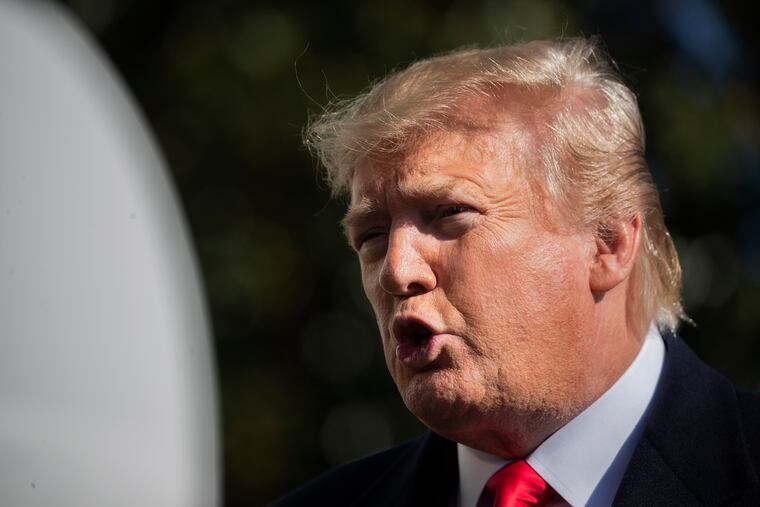Trump: Whistleblower ‘must be brought forward to testify’
President Trump says it's not enough for whistleblower who raised alarms about his dealings with Ukraine and touched off Democratic-led impeachment inquiry to answer questions in writing.

WASHINGTON — The whistleblower who raised alarms about President Donald Trump’s dealings with Ukraine and touched off the Democratic-led impeachment inquiry is willing to answer written questions submitted by House Republicans, the person’s lawyer says.
But President Donald says that's not good enough.
Trump himself refused to provide anything but written answers in response to limited questions during the special counsel's investigation into Russian interference during the 2016 election.
The testimony offer, made over the weekend to Rep. Devin Nunes, the top Republican on the Intelligence Committee, followed escalating attacks by Trump and his GOP allies who are demanding the whistleblower's identity be revealed.
It would allow Republicans to ask questions of the whistleblower without having to go through the committee's chairman, Democratic Rep. Adam Schiff.
"Being a whistleblower is not a partisan job nor is impeachment an objective. That is not our role," Mark Zaid, the whistleblower's attorney, tweeted Sunday.
"We will ensure timely answers," he said.
U.S. whistleblower laws exist to protect the identity and careers of people who bring forward accusations of wrongdoing by government officials. Lawmakers in both major political parties have historically backed those protections.
But Trump, weighing in on Twitter Monday morning, said the person should appear publicly.
"He must be brought forward to testify. Written answers not acceptable!" Trump wrote, slamming the entire process as a "Con!"
Trump has denied he did anything wrong in his July 25 phone call with Ukrainian President Volodymyr Zelenskiy, in which he pressed Zelenskiy to investigate Trump's political rivals. At the time, the administration was withholding military aid to Ukraine that had been approved by Congress.
That call sparked the complaint that led to the inquiry.
Zaid said the whistleblower would answer questions directly from Republican members "in writing, under oath & penalty of perjury." Only queries seeking the person's identity won't be answered, he said.
Nunes' office did not have immediate comment.
The new proposal came as Trump stepped up his attacks on the investigation, tweeting on Sunday, "Reveal the Whistleblower and end the Impeachment Hoax!"
The whistleblower's secondhand account of the phone call has been providing a road map for House Democrats investigating whether the president and others in his orbit pressured Ukraine to probe political opponents, including former Vice President Joe Biden.
Democrats are heading into a crucial phase of their impeachment inquiry as they move toward public impeachment hearings this month. They have called for testimony in the coming weeks from 11 witnesses, including Energy Secretary Rick Perry and former national security adviser John Bolton in closed-door interviews. It's unclear whether any of them will come to Capitol Hill.
Trump is also pushing the news media to divulge the whistleblower's identity.
"They know who it is. You know who it is. You just don't want to report it," Trump told reporters at the White House on Sunday. "And you know you'd be doing the public a service if you did."
The Associated Press typically does not reveal the identity of any whistleblower.
The whistleblower's complaint has been corroborated in many respects by people with firsthand knowledge of the events who have appeared on Capitol Hill.
Trump says he demanded no quid pro quo, as has been alleged, but he also says such arrangement are common while leveraging power in conducting foreign policy.
The whistleblower has become a central focus for Republicans, and in particular the president. The intelligence community's inspector general has said the person could have an "arguable political bias," but he nevertheless found the whistleblower's complaint to be "credible."
The president believes that if he can expose bias in the initial allegations against him, he can paint the entire impeachment inquiry as a partisan, political probe. To this point, Republicans have largely fought the inquiry on process, not substance, arguing it is tainted because interviews are being conducted in closed sessions — though GOP lawmakers are in attendance and grilling the witnesses — and complaining that House Speaker Nancy Pelosi had not called a vote to launch the matter.
Pelosi did call such a vote last week — the inquiry was approved in a mostly partisan vote — and the investigation will soon shift into open hearings.
House Minority Leader Kevin McCarthy, R-Calif., said Sunday that he had not yet discussed the whistleblower's offer with Nunes, but agreed with Trump that the person should answer questions in a public appearance before the committee.
"When you're talking about the removal of the president of the United States, undoing democracy, undoing what the American public had voted for, I think that individual should come before the committee," McCarthy told CBS' "Face the Nation."
Attorney Zaid said his team had addressed the issue of alleged bias with Republican members of the committee and had stressed the need for anonymity to maintain the safety of the whistleblower and that person's family, "but with little effect in halting the attacks."
"Let me be absolutely clear: Our willingness to cooperate has not changed," tweeted Andrew P. Bakaj, another attorney representing the whistleblower. "Their fixation on exposing the whistleblower's identity is simply because they're at a loss as to how to address the investigations the underlying disclosure prompted."
___
Associated Press writer Jonathan Lemire in New York contributed to this report.